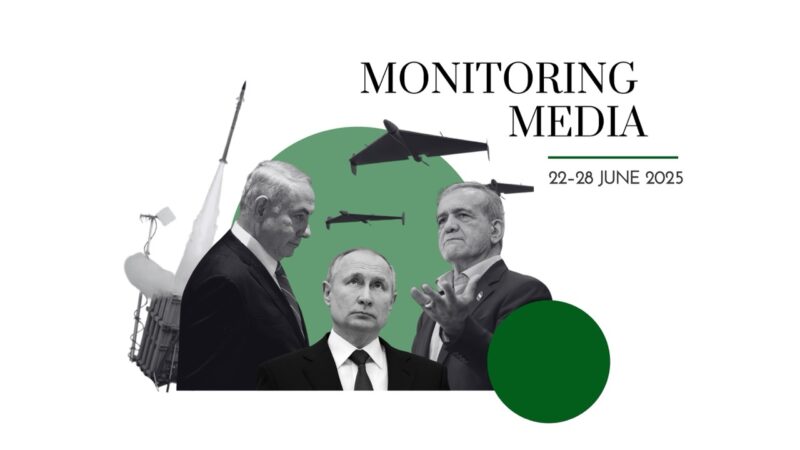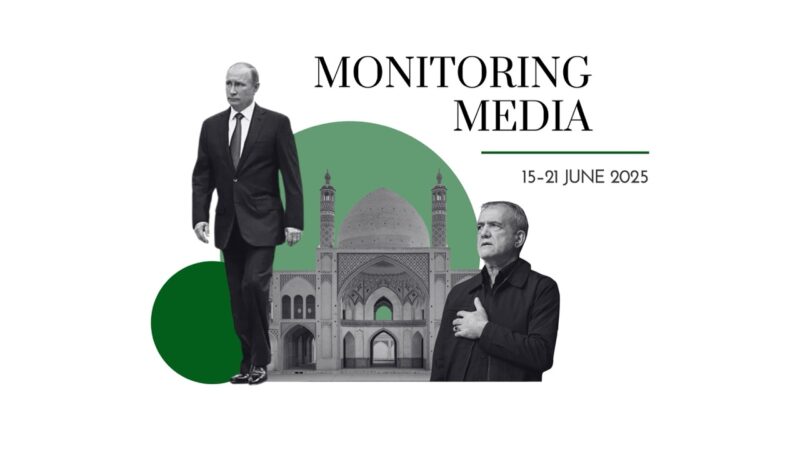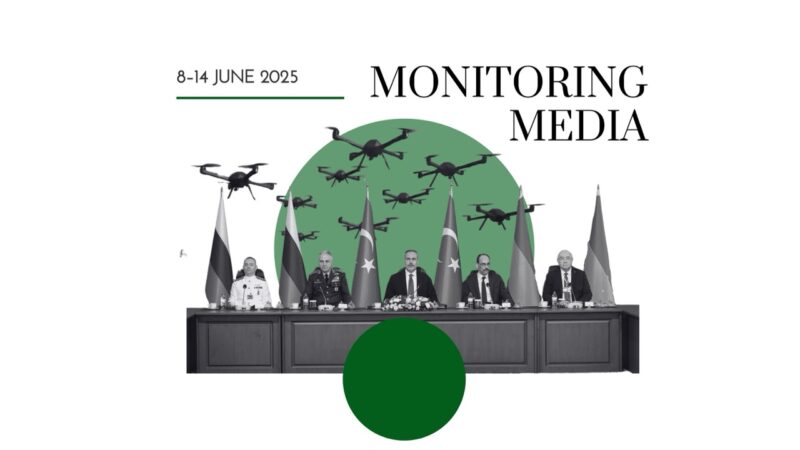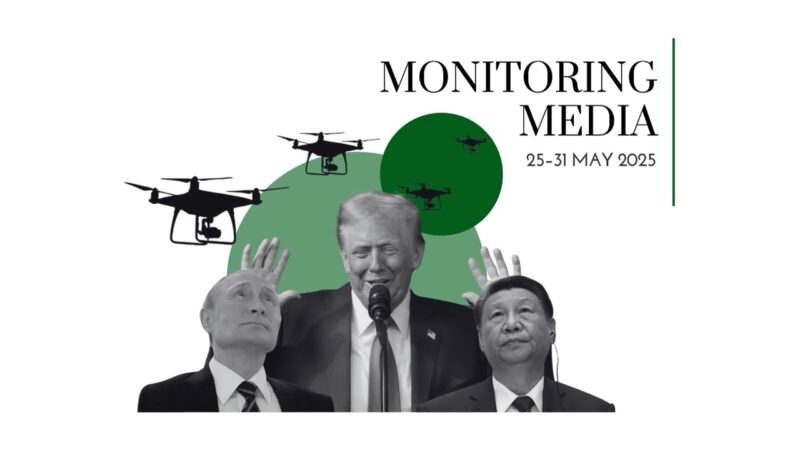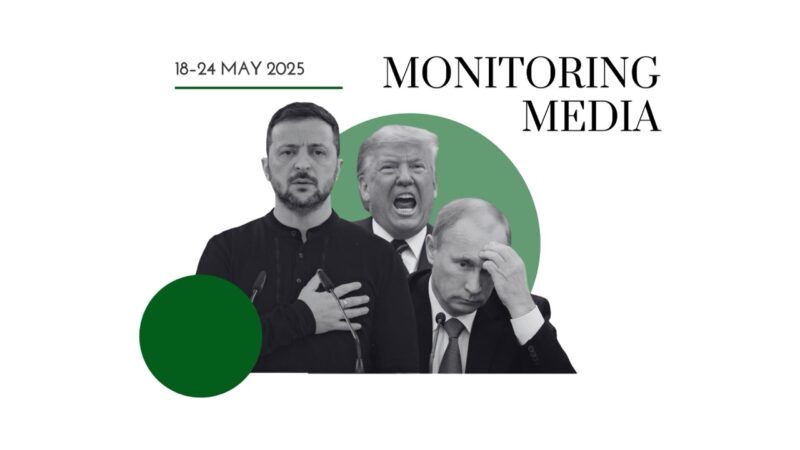Ukraine’s admission to NATO would not push Russia to change its war strategy

CIUS’s report on Canadian media coverage of Ukrainian affairs, 16–25 October 2022
Seven media outlets—The Globe and Mail, Toronto Star, Calgary Herald, L’Acadie Nouvelle, Le Journal de Montréal, Ici RDI, and Le Soleil—were surveyed to prepare this report on how the situation in Ukraine and Canada’s role in the war have been portrayed in Canadian media during the ten-day period of 16–25 October 2022. The sample of publications was selected based on their impact on public opinion as well as their professional reputation, popularity among readers, and topical relevance.
This analysis reviews only original reporting about Ukraine produced by the selected publications in the stated timeframe. It covers texts from special sections on Ukraine, paper editions of the magazines, and opinion columns and editorials.
Key messages:
- Ukraine’s NATO aspirations need backing from the West;
- The UN has been mainly powerless in its response to Ukraine’s war;
- Alberta Premier Danielle Smith’s comments on Ukraine cause a backlash;
- The West needs a reminder that inflation might not be the biggest problem.
Main topics:
NATO and the West need to take a bold step toward Ukraine
The Globe and Mail’s editorial board published an opinion titled “The arguments against supporting Ukraine.” They analyze the popular debate as to whether Canada, the US, NATO, and in general the West should not be involved in the war in Ukraine, as well as two anti-Ukrainian arguments that they have encountered—both misleading, the authors note.
The first argument, the Globe and Mail writes, is more of a moral claim: that responsibility for the war lies not with the Kremlin but rather with Ukraine and NATO. This argument supports the fact that the collective West should not be sanctioning Russia or arming Ukraine, “because in doing so we (the West) are not only prolonging the war; we’re backing the bad guys.”
The authors of the opinion piece emphasize that it is difficult to square such claims with facts, and here is why: “The idea that Ukraine caused the war doesn’t withstand scrutiny. One UN member state invaded another UN member state, for the second time in eight years, and—also for the second time—annexed territory. The country doing the invading is Russia; the country subjected to annexation is Ukraine.” The authors summarize that the only way in which Ukraine “provoked” Russia was by existing.
The second argument against helping Ukraine is that supporting Ukraine brings no benefit to the West and risks triggering World War Three. As Russia’s President Vladimir Putin yet again attempts to redraw international borders in the heart of Europe, it is worth noting that “his arguments for invading and carving up Ukraine apply to any country that was formerly part of the Soviet Union or the Soviet sphere in Europe. The Baltic states, Poland, and others feel threatened, and history plus Mr. Putin’s own statements provide them with ample reason.” Even though the threats of a war spilling over onto other nations and Russia using nuclear weapons are real, the misguided opinion reads, “It’s difficult to argue that the West’s wisest response to Mr. Putin’s threats is to simply walk away.”
Premier Danielle Smith’s comments on Ukraine
Bill Kaufman (Calgary Herald) writes that after Alberta Premier Danielle Smith came under fire for appearing to support the idea that regions of Ukraine which “feel more affinity to Russia” should be allowed to break away, she “blamed the media for inflaming the controversy.”
Kaufman reminds readers that the initial speculation occurred in a 24 February post on the website locals.com. Another post—which has apparently been deleted since—appears to insinuate that NATO and Ukraine are partially responsible for Russia’s invasion.
Following a fierce backlash from the Ukrainian community as well as the general public, Kaufman reports that the premier said she “will always stand with the Ukrainian people,” but also that she subsequently insisted “she believes Albertans don’t want to dwell on past comments, accusing the media of doing just that to exploit her words.” “The media loves to be able to try to find something that’ll get them the maximum number of clicks and outrage…I would put that back on you (media) guys. I would prefer you deal with issues that are substantive to Albertans,” Smith was quoted as saying.
She issued an apology on Oct. 18, a day after the analyzed article was published.
Andrew Phillips (Toronto Star) argues in his opinion piece that Premier Smith’s comments on Ukraine “underline the strange alliance between the far right and the extreme left on the issue of Ukraine.”
“Somehow, as Russia pursues its brutal, colonialist project of dismembering a neighbouring state, these two camps have made common cause in calling on the West to dial down its support for Ukraine and make peace at all costs their main goal,” Phillips writes. He explains that on the right side of the spectrum are “so-called ‘realist’ foreign policy thinkers” who argue that the West provoked Russia by expanding eastward. On the left side are “the self-styled ‘anti-imperialists’ who see the hand of Washington manipulating the Ukrainians as part of a ‘proxy war’ against Russia.” Every war ends with negotiations, they argue, so instead of giving Ukraine weapons the West should be promoting the idea of peace talks.
Both arguments, according to Phillips, essentialy brush aside the will of the Ukrainian people to defend their existence, cultural autonomy, and their country’s territorial integrity, which have been brutally threatened in contravention of international law.
Phillips concludes by saying that “Danielle Smith ought to know better than to dabble in these waters, especially since she represents a province with so many people of Ukrainian heritage (including, it turns out, herself). More to the point, others ought to be careful about giving oxygen to neo-colonialist arguments coming from both extremes of the ideological spectrum.”
Here are some of our Francophone selections from this time period:
United Nations proves its powerlessness against Russia’s aggression.
François Brousseau (Ici RDI) opines on the role of the United Nations and argues that in the Russo-Ukrainian war “the UN is playing a decorative role and is relegated to the backroom.” Brousseau believes that the organization shows “powerlessness” when it comes to decision making by the UN Security Council—where it only takes a single vote from Russia as one of the five permanent council members to block any resolutions concerning Ukraine.
“The peripheral successes of many UN agencies, the importance of what they do, and what they say in their respective fields cannot make us forget that the parent company is in bad shape and that on the central issue the problem hurts… and bleeds terribly.”
Brousseau concludes by posing the question of what the future holds for the UN: “Perhaps a test like the war in Ukraine will lead to the moment of truth or produce an electric shock to this organization, which was and remains a beautiful and great idea.”
Loïc Tassé (Le Journal de Montréal) in his opinion piece titled “De plus en plus dangereux” (More and more dangerous) also touches on the role of the UN in Russia’s war against Ukraine. Tassé quotes the German Minister of Foreign Affairs, Tobias Linder, who declares that Russia is engaging in a genocide in Ukraine. “He is right,” Tassé writes. “It is not simply a cultural genocide, which aims to erase all or a part of Ukrainian culture, but a genocide in the primary sense of the UN definition.”
Tassé also reminds readers that over 12 million Ukrainians out of a population of 40 million have left Ukraine because of the war. “Putin has deported 200,000 Ukrainian children, who risk being Russified. He does not recognize the existence of Ukraine. He extensively bombs cities and vital facilities for civilians, even if the Ukrainian army is not stationed in those areas.”
Tassé believes that in some sense “the UN has become a hostage to dictatorships.”
“In theory, the member states of the UN should band together against Russia. The prevention of genocides is one of the reasons the UN exists. But how far will Putin go before a genocide is recognized by the UN, if ever it will be?”
In her article titled “Des crimes en Ukraine qui dépasseraient le Rwanda” (Crimes in Ukraine exceed those of Rwanda) Patrice Bergeron (Le Soleil) quotes Marie Lamensch, a researcher specializing in genocide studies, who underscores the severity of Russia’s war crimes in Ukraine. Lamensch, who studied the Rwandan genocide, is quoted as saying, “I never saw violence like what was expressed in Ukraine [even though] I did not want to compare the two [Rwanda and Ukraine]. Neither one is better than the other.” However, it is “the ‘hyperviolence’ of the war in Ukraine that exceeds what we have seen before,” Lamensch said during the Danyliw Seminar in October, titled “Ukraine at War,” at the University of Ottawa.
The West needs reminding that inflation isn’t its biggest problem.
Françoise Enguehard (L’Acadie Nouvelle) argues in her opinion editorial “Le prix de la guerre” (The price of war) that despite price shock and pressure on Canadian households resulting from Russia’s war against Ukraine, it is worth remembering that inflation is a “tiny share of the burden taken on by the Ukrainian people.”
Enguehard continues by stressing that “one-third of [Ukraine’s] power plants has been put out of use. [Ukraine’s President Zelensky] does not have, like us, the option of complaining or waiting for help. His only option is a resistance fed by heroism and perseverance.”
Enguehard’s piece, which was published by L’Acadie Nouvelle, an independent French newspaper in Caraquet, New Brunswick, concludes with this advice: “As winter arrives, both in Acadia and in Ukraine, it would be a good idea to get closer to the Ukrainian families who have taken refuge with us, to accompany them in their moral and physical trials, as our ancestors would have appreciated so much that foreigners do.”
Translations from French by Kevin Theriault and Olena Goncharova-LaFoy.
Worth your attention:
Mark Wesley (Globe and Mail) argues in his op-ed that “the time has come for a decision on admitting Ukraine to NATO.” Wesley notes that this decision won’t be an easy one, despite some countries’ active support (at least 9 out of 30 NATO members have already signed a joint statement supporting Ukraine’s bid to join the alliance). Canada wasn’t among those backing Ukraine’s aspirations: “Canada’s silence on the NATO application has been deafening—especially for a country that prides itself on its status as a NATO founding member and as a strong supporter and close ally of Ukraine.”
Wesley believes that Canada was cautious regarding Ukraine’s situation mainly out of “fear of worsening the conflict” and even “giving support to Mr. Putin’s long-standing claims that NATO and the West threaten the very existence of Russia.”
CIUS’s Media Monitoring Service reminds its readers that those claims are myths that have been debunked numerous times. NATO’s official policy is that “NATO does not seek confrontation and poses no threat to the Russian Federation.” NATO did not invade Georgia; NATO did not invade Ukraine; Russia did. It is also worth noting that before Russia’s illegal annexation of Crimea in 2014 there were no Allied troops in the eastern part of the Alliance’s covered territory.
With that in mind, Canada should have welcomed Ukraine’s bid, Wesley writes, the same as it did for Sweden and Finland, because Ukraine’s admission to NATO would not make “a whit of difference to the Russian claim that this is a ‘special military operation.’”
“Mr. Putin will go on spinning his tales of NATO encirclement and aggression to any willing audience. Russian nuclear sabre-rattling will continue no matter what happens to Ukraine’s bid,” Wesley declares. He then concludes that the long-term security guarantee of NATO membership would be a light at the end of the tunnel for Ukraine “and would also be a strong response to Mr. Putin’s neo-imperial ambitions.”
